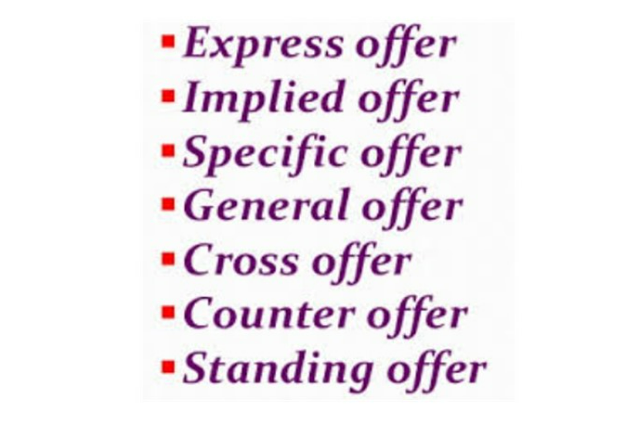INTRODUCTION
As per Section 2(h) of the Indian contract act, 1872 ‘A contract is an agreement enforceable by law’. A contract is a result of an offer and acceptance, enforceable by law. The process of a contract starts with an offer made by one party and the acceptance by another party.
The offer is the first step towards the formation of a contract. The whole process of entering into the contract starts when one party makes an offer to another party. Offer defined under section 2(a) of the Indian contract act,1872 states that ‘When a person signifies to another his willingness to do or to abstain from doing anything, to obtain the assent of that other to such act or abstinence, he is said to make a proposal. An offer made signifies or expresses the willingness of that person to enter into a contract. It basically means that a person is signifying(communicating) to the other person his intention or willingness to do or not to do a particular thing.
Ingredients:
A person making an offer/proposal is known as the promisor or the offeror and the person accepting such offer is known as the promisee, offeree, or acceptor.
The offeror has to express his willingness to do or to abstain from doing an act. Only willingness or mere desire to do or not do an act will not constitute an offer.
An offer can be positive or negative. It can be a promise to do or abstain from doing some act. Both are valid offers.
Illustration: A makes an offer to sell his apartment to B for Rs. 50 lakhs. This is a proposal. Here, A is the offeror and B is the offeree.
ESSENTIALS TO A VALID OFFER
Offer must be communicated:
Communication of the offer is essential. As per section 2(a) of the contract act, when a person signifies to another his willingness to do or not to an act’ here the word signifies means to communicate. A person who is willing to enter into a contract must communicate his willingness to the other party to receive an assent or approval. A person can accept the offer only if he knows it. If the offer is not conveyed to the offeree, then ultimately there would be no acceptance to enter into a contract. In Fitch v. Snedeker, it was held that the plaintiff was not entitled to get the reward as he didn’t know about the offer. When he was unaware of the offer there couldn’t be any acceptance. So, no valid contract.
Offer cannot come into effect until and unless it has been brought into the knowledge of the person to whom it is made.
Section 4 of the Indian Contract Act, states that the communication of the proposal is complete when it comes to the knowledge of the person to whom it is made.
For example; A proposes, by letter, to sell the car to B for Rs. 50,000. The communication of the offer is complete when B receives the letter.
Offer must be capable of creating a legal relationship:
Law of contract deals with the agreements which create legal rights and obligations, social or religious activities will not constitute a contract. An offer made must always intend to create a legal relationship. If the offer is not intended to create a legal relationship, it is void.
In Balfour v. Balfour, the plaintiff’s husband had promised her orally to pay an allowance of 30 pounds a month for her maintenance until she joins him. On his failure to pay the allowance, the plaintiff filed a suit for recovery of the promised amount. But her suit was dismissed, and the court held that the agreement was only an arrangement between the husband and wife, and they never intended to create any legal obligation.
Terms of an offer must be certain:
The terms and conditions of the offer must be certain, definite and rational. If the terms are ambiguous, vague, indefinite or irrational then it is not a lawful offer and would not be enforceable. In gutting v. Lyn, the defendant while purchasing a horse from the plaintiff, had promised to buy another horse, or pay 45 instead of it, if the horse proved lucky. Later, he neither purchased the horse nor paid 45. Plaintiff sued him for his failure to fulfil the promise. But it was held that the term ‘proved lucky’ was vague, and the offer was invalid.
For example, A makes an offer to B, to run at a speed of 500 miles in 30 minutes for which he promises to give him Rs. 400. Here, the offer made is void because it is too vague and irrational.
Offer is different from an invitation to the offer:
When a party, proposes certain terms on which he is willing to negotiate, in this case, he does not make an offer, he only invites other people to make an offer on those proposed terms. This is known as an invitation to offer. Invitation to offer is not the final willingness of the party, to enter into the contracts. It merely circulates his information to the public, to offer him. In Harris v. Nickerson, it was held that the announcement or advertisement made to hold an auction is not an offer but only an invitation to an offer and therefore the breach of contract does not exist.
Offer is made, intending to obtain the assent:
An offer is made with the sole purpose of obtaining approval from the other party to whom the offer is made. If there is no acceptance or approval for the offer made, then there would be no binding promise on the parties. An offer once accepted becomes a promise.
Terms of the offer must be conditional:
An offeror is free to make any terms and conditions as per his will and if those conditions are accepted by the offeree, then he has to abide by all the terms and conditions. Specific terms and conditions in an offer must be brought into the notice of the promise at the time of making the contract. In Henderson v. Stevenson, the plaintiff was entitled to recover the loss from the company. Because the company failed to draw the attention of the passengers on the terms and conditions, mentioned in the ticket which said that the company was not liable for the loss of any kind.
Non-compliance with any term would not be considered as an acceptance:
If the acceptor has not communicated his acceptance within a specific period, the offeror should not consider it as acceptance.
For instance, if A made an offer to B to sell his bike for 20000/-. And the offer is not refused/rejected within a specific time prescribed by the offeror. Thus, in this case, the offeror should not assume acceptance of the offeree, if he does, it will be an invalid offer.
TYPES OF OFFERS
- Specific offer:
A specific offer is an offer that is made to a specific person or a specific group of individuals. In this case, the acceptance of that specific individual or group is enough for the foundation of the contract. For instance, A offers B to purchase his bike for Rs. 25000. Therefore, a specific offer is made to an individual, B, only he may accept or decline the offer.
- General offer:
When an offer is made to the public at large, it is called a general offer or offer at large. The most common case used to understand this offer is Carlill v. Carbolic smoke ball company. In this case, it was advertised by the Carbolic smoke ball company that, the reward of 100 pounds will be paid to any person who contracts influenza after having used the smoke ball. However, the plaintiff relying on the advertisement used the medicines as per the direction and still contracted influenza. She sued the company claiming for the reward. But the defendant argued that the offer was not made with an intention to enter into a contract. it was stated in the court that in general offers, there is no need of communicating the acceptance to the party who makes the offer. The performance of the condition mentioned in the contract itself signifies his/her acceptance.
In general offer, if the person performs the condition without knowing the offer, he is not entitled to receive the reward. Lalman Shukla v. Gauri Dutt.
- Express offer:
An offer made through words that can be written or spoken is known as an express offer. An oral offer can be made through telephone or in-person, whereas a written offer can be made through advertisements, emails or telegram.
- Implied offer:
An offer that is gathered from surrounding circumstances or conduct of the parties is known as an implied offer.
- Standing offer:
An offer that remains open for acceptance or is continuous over a while is called a standing offer
- Cross offer:
When there are similar offers made by 2 parties at the same time without knowing each other offer is known as a cross offer. For instance, A makes an offer to B to sell his laptop for 10000, while B unknowingly makes an offer to A to purchase his laptop for 10000. Thus, there would be acceptance.
- Counter offer:
When an offeree is willing to welcome the offer if certain modifications are made, then such offers are said to be a counter offer. The counter offer is the rejection of a previous offer and placing a new offer. when a counteroffer is made by the offeree, there could not be a valid contract between the contracting parties.
Offer is very essential to contract, without an offer we can't form a contract. For forming a contract it need to be accepted.


